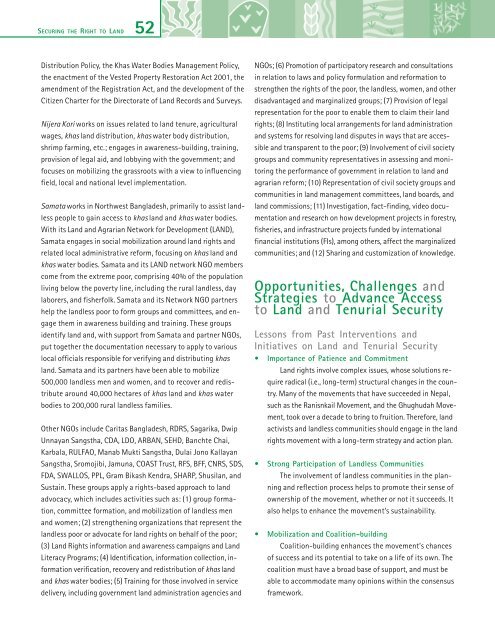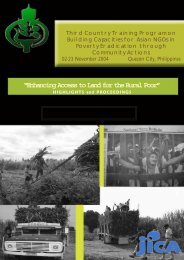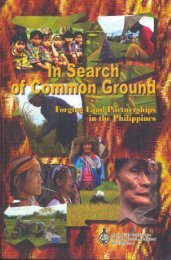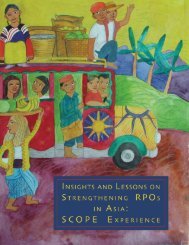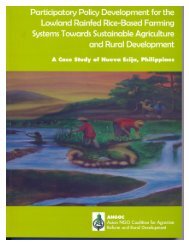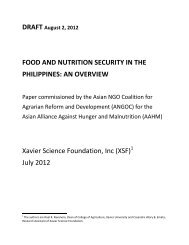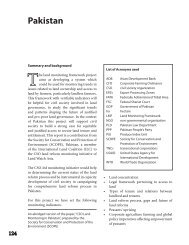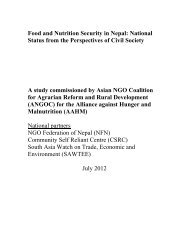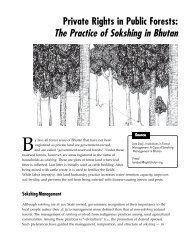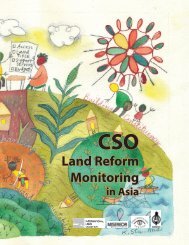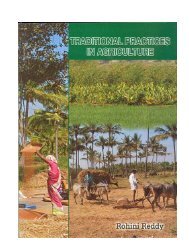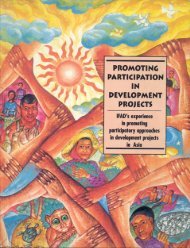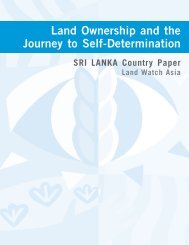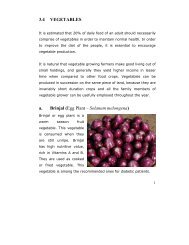Securing the Right to Land FULL - ANGOC
Securing the Right to Land FULL - ANGOC
Securing the Right to Land FULL - ANGOC
Create successful ePaper yourself
Turn your PDF publications into a flip-book with our unique Google optimized e-Paper software.
SECURING THE RIGHT TO LAND<br />
52<br />
Distribution Policy, <strong>the</strong> Khas Water Bodies Management Policy,<br />
<strong>the</strong> enactment of <strong>the</strong> Vested Property Res<strong>to</strong>ration Act 2001, <strong>the</strong><br />
amendment of <strong>the</strong> Registration Act, and <strong>the</strong> development of <strong>the</strong><br />
Citizen Charter for <strong>the</strong> Direc<strong>to</strong>rate of <strong>Land</strong> Records and Surveys.<br />
Nijera Kori works on issues related <strong>to</strong> land tenure, agricultural<br />
wages, khas land distribution, khas water body distribution,<br />
shrimp farming, etc.; engages in awareness-building, training,<br />
provision of legal aid, and lobbying with <strong>the</strong> government; and<br />
focuses on mobilizing <strong>the</strong> grassroots with a view <strong>to</strong> influencing<br />
field, local and national level implementation.<br />
Samata works in Northwest Bangladesh, primarily <strong>to</strong> assist landless<br />
people <strong>to</strong> gain access <strong>to</strong> khas land and khas water bodies.<br />
With its <strong>Land</strong> and Agrarian Network for Development (LAND),<br />
Samata engages in social mobilization around land rights and<br />
related local administrative reform, focusing on khas land and<br />
khas water bodies. Samata and its LAND network NGO members<br />
come from <strong>the</strong> extreme poor, comprising 40% of <strong>the</strong> population<br />
living below <strong>the</strong> poverty line, including <strong>the</strong> rural landless, day<br />
laborers, and fisherfolk. Samata and its Network NGO partners<br />
help <strong>the</strong> landless poor <strong>to</strong> form groups and committees, and engage<br />
<strong>the</strong>m in awareness building and training. These groups<br />
identify land and, with support from Samata and partner NGOs,<br />
put <strong>to</strong>ge<strong>the</strong>r <strong>the</strong> documentation necessary <strong>to</strong> apply <strong>to</strong> various<br />
local officials responsible for verifying and distributing khas<br />
land. Samata and its partners have been able <strong>to</strong> mobilize<br />
500,000 landless men and women, and <strong>to</strong> recover and redistribute<br />
around 40,000 hectares of khas land and khas water<br />
bodies <strong>to</strong> 200,000 rural landless families.<br />
O<strong>the</strong>r NGOs include Caritas Bangladesh, RDRS, Sagarika, Dwip<br />
Unnayan Sangstha, CDA, LDO, ARBAN, SEHD, Banchte Chai,<br />
Karbala, RULFAO, Manab Mukti Sangstha, Dulai Jono Kallayan<br />
Sangstha, Sromojibi, Jamuna, COAST Trust, RFS, BFF, CNRS, SDS,<br />
FDA, SWALLOS, PPL, Gram Bikash Kendra, SHARP, Shusilan, and<br />
Sustain. These groups apply a rights-based approach <strong>to</strong> land<br />
advocacy, which includes activities such as: (1) group formation,<br />
committee formation, and mobilization of landless men<br />
and women; (2) streng<strong>the</strong>ning organizations that represent <strong>the</strong><br />
landless poor or advocate for land rights on behalf of <strong>the</strong> poor;<br />
(3) <strong>Land</strong> <strong>Right</strong>s information and awareness campaigns and <strong>Land</strong><br />
Literacy Programs; (4) Identification, information collection, information<br />
verification, recovery and redistribution of khas land<br />
and khas water bodies; (5) Training for those involved in service<br />
delivery, including government land administration agencies and<br />
NGOs; (6) Promotion of participa<strong>to</strong>ry research and consultations<br />
in relation <strong>to</strong> laws and policy formulation and reformation <strong>to</strong><br />
streng<strong>the</strong>n <strong>the</strong> rights of <strong>the</strong> poor, <strong>the</strong> landless, women, and o<strong>the</strong>r<br />
disadvantaged and marginalized groups; (7) Provision of legal<br />
representation for <strong>the</strong> poor <strong>to</strong> enable <strong>the</strong>m <strong>to</strong> claim <strong>the</strong>ir land<br />
rights; (8) Instituting local arrangements for land administration<br />
and systems for resolving land disputes in ways that are accessible<br />
and transparent <strong>to</strong> <strong>the</strong> poor; (9) Involvement of civil society<br />
groups and community representatives in assessing and moni<strong>to</strong>ring<br />
<strong>the</strong> performance of government in relation <strong>to</strong> land and<br />
agrarian reform; (10) Representation of civil society groups and<br />
communities in land management committees, land boards, and<br />
land commissions; (11) Investigation, fact-finding, video documentation<br />
and research on how development projects in forestry,<br />
fisheries, and infrastructure projects funded by international<br />
financial institutions (FIs), among o<strong>the</strong>rs, affect <strong>the</strong> marginalized<br />
communities; and (12) Sharing and cus<strong>to</strong>mization of knowledge.<br />
Opportunities, Challenges and<br />
Strategies <strong>to</strong> Advance Access<br />
<strong>to</strong> <strong>Land</strong> and Tenurial Security<br />
Lessons from Past Interventions and<br />
Initiatives on <strong>Land</strong> and Tenurial Security<br />
Importance of Patience and Commitment<br />
<strong>Land</strong> rights involve complex issues, whose solutions require<br />
radical (i.e., long-term) structural changes in <strong>the</strong> country.<br />
Many of <strong>the</strong> movements that have succeeded in Nepal,<br />
such as <strong>the</strong> Ranisnkail Movement, and <strong>the</strong> Ghughudah Movement,<br />
<strong>to</strong>ok over a decade <strong>to</strong> bring <strong>to</strong> fruition. Therefore, land<br />
activists and landless communities should engage in <strong>the</strong> land<br />
rights movement with a long-term strategy and action plan.<br />
Strong Participation of <strong>Land</strong>less Communities<br />
The involvement of landless communities in <strong>the</strong> planning<br />
and reflection process helps <strong>to</strong> promote <strong>the</strong>ir sense of<br />
ownership of <strong>the</strong> movement, whe<strong>the</strong>r or not it succeeds. It<br />
also helps <strong>to</strong> enhance <strong>the</strong> movement’s sustainability.<br />
Mobilization and Coalition-building<br />
Coalition-building enhances <strong>the</strong> movement’s chances<br />
of success and its potential <strong>to</strong> take on a life of its own. The<br />
coalition must have a broad base of support, and must be<br />
able <strong>to</strong> accommodate many opinions within <strong>the</strong> consensus<br />
framework.


